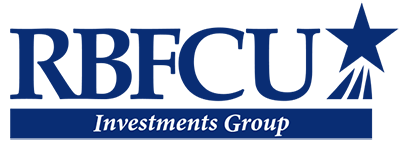How to Plan Financially for Every Life Stage
Much as you change your attire according to the seasons, it’s wise to manage your finances in ways that reflect where you are in your personal journey. Let’s talk about what to consider at each of life’s stages.

After all, a person beginning a new career has different needs than someone embarking on retirement. Similarly, a new parent has concerns unique from someone parenting a teenager or welcoming a grandchild.
As you explore the following life stages and their corresponding common financial concerns, you may find yourself feeling confident about the choices you’ve already made. Or you may identify issues to address with a financial advisor, someone who can provide guidance and support as you greet what awaits on the road of life.
Either way, remember: RBFCU Investments Group is here to help.
Four financial significant life stages
Stage 1: Early career years
Each generation emerges into the workforce a little differently. Some people find robust economies and ample job opportunities awaiting. Others encounter inflation, recessionary economies and narrower financial prospects.
Then there are the choices we make professionally, too, as individuals. Some degrees or training programs offer clear paths toward high-paying jobs with employer-sponsored retirement plans, life and disability insurance options, health care and maybe a little extra cash with which to invest. Other career trajectories may offer more personal or creative freedom but less financial security.
Whatever these early days may look like for you as a young professional, there are several things you can do to begin building financial health — even on a shoestring budget.
For instance, practice living within your means so that you can establish a good credit history and build up your savings. Keep debts minimal. Explore putting away a little extra money for retirement, travel or your dream home. Consider purchasing health care or disability insurance, if not offered by an employer, to protect yourself and your finances if an accident or illness were to occur.
How we can help you: At this stage, and depending upon your comfort level and financial worth, you may be able to be a bit bolder with your investments. A good financial advisor can help you assess your comfort with risk, review your current plan (if a formal one is in place), and suggest strategies and solutions that could bring your plan into better alignment with where you are — and where you want to be.
Stage 2: Family and mid-career years
Much like one’s early career years, employer-sponsored financial solutions, such as 401(k)s, and insurance options are foundational in this stage for most people.
Beyond that, you may find yourself:
- Considering investing in a home or buying an automobile
- Starting or expanding a business
- Saving money to return to graduate school or send your kids to college
- Investing more heavily in retirement planning
- Managing funds inherited from an older family member
- Developing more tax-efficient wealth management strategies
- Purchasing life insurance to protect your family if they were to lose you (and your income) suddenly
Continue to keep an eye on debt, however, including credit cards. It may also be a good idea to put basic estate planning documents in place, such as a will.
Marriage, divorce or remarriage, coupled with the arrival of children, stepchildren and even grandchildren, are considerations that can have a significant effect on both wealth and long-term planning.
Plus, if you are married or living in a committed, long-term relationship, it’s often in these years that one partner decides to place greater priority on raising young children or caring for elderly parents. Should that occur — and because so doing can diminish the caregiver’s lifetime earnings significantly, you may want to give special consideration to putting aside extra money for her (or his) retirement or career re-training down the road.
How we can help you: Given that life and responsibilities become more complicated financially during your 30s and 40s, this stage is understandably the one during which most people first turn to a financial advisor. If you do have an existing financial plan, however, getting a second opinion from an RBFCU Investments Group financial advisor is wise, especially if you’ve had big changes in your life. Depending upon your unique needs, we also can make referrals to other resources, such as a life insurance provider, estate attorney or trust officer.
Stage 3: Late career years
Your kids may be off at college — or about to leave the nest — and perhaps you have begun to contemplate life after your own career.
If you’ve planned wisely and protected your assets well over time, you might have several options on the table, including launching a business or paying off your mortgage and debts.
Widowed or newly divorced people may find themselves resetting careers, downsizing their homes or both. For those of us who still have parents living or other adult family members relying upon us for caregiving, we may find ourselves taking on more financial responsibilities, too. Some young grandparents may find themselves wanting or needing to take on financial responsibilities related to grandchildren.
With your own golden years on the horizon, this phase of life is a good time to review your retirement plans and assets, perhaps revisiting how much risk you’re now willing to take with your investments. As you prepare to become a retiree, there may be special tax considerations about which you should be aware. So it’s smart to educate yourself on those matters.
Additionally, if you’ve neglected creating a will or estate plan, those conversations can become more essential to ensuring your wishes are fulfilled. This is especially true if you have a sizable amount of assets (property, money, etc.) that will need to be distributed after your death via a will or trust.
How we can help you: Even if you’ve been working with another advisory firm, a second opinion at this stage may reveal gaps in your savings, investments portfolio, retirement plans, insurance (especially long-term care) and so forth. It’s also a good time to evaluate fees being paid to your current financial advisor, benchmark them with other financial advisors, and ask yourself: “Am I getting my money’s worth?”
Again, this is also the life stage in which it’s smart to have a financial advisor review your plans in light of changing responsibilities and fluctuations in your risk tolerance — especially as retirement appears on the horizon.
Stage 4: Retirement years (and beyond)
Taking stock of your financial well-being, managing your assets in ways that can stretch your dollars further, and getting better acquainted with tax issues related to retirement fund distributions are all important objectives during these years. Leaving a legacy may become more top of mind, too, especially as you reach your 70s and 80s.
How we can help you: A financial advisor can help you integrate forward-thinking estate planning strategies into your overall financial plan. By collaborating with other estate planning professionals (e.g., attorneys, accountants), they can help you craft a legacy of love.
Plus, if you choose to build a relationship with our team now, we can be a resource for your family — and their own financial plans — after your passing.
The takeaway
In the seasons of life, we all encounter common financial needs and concerns. Despite those commonalities, your experience is unique and may come with a mix of sunny and rainy days. We’re here to help.
As you plan for the future, count on RBFCU Investments Group to provide guidance and assistance. Whether college funding, general investments or retirement planning are top of mind for you today, our team is here for you.




